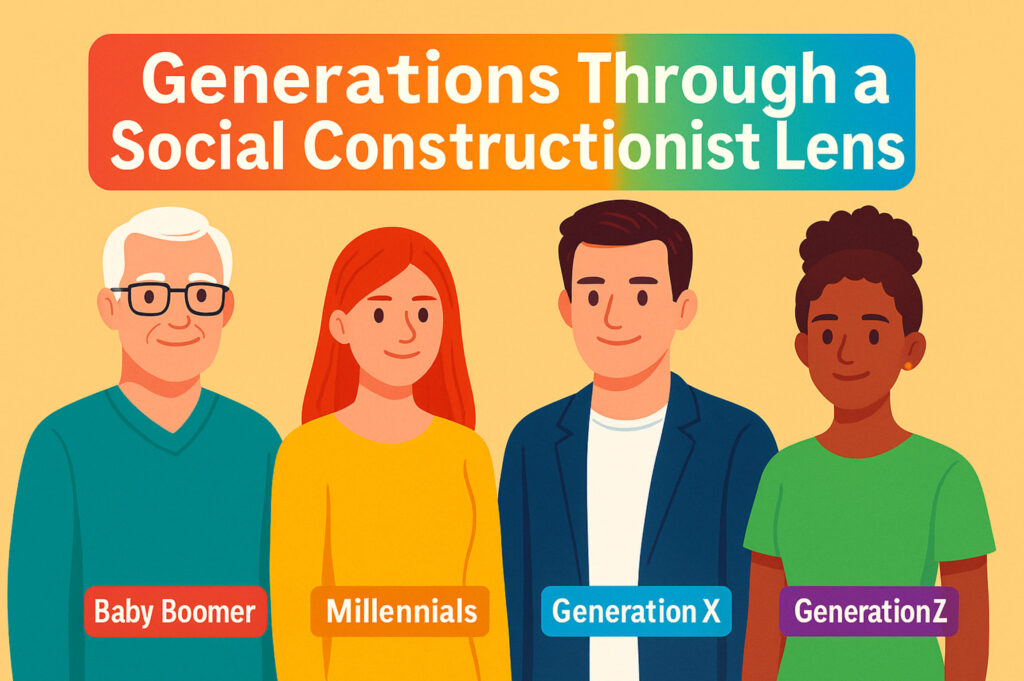From typewriters and handwritten notes to tablets and AI-generated essays, the experience of being a student has evolved dramatically over the decades. These generational differences in students reveal how social norms and technology shape expectations around effort, feedback, and authority. As instructors, we often see how generational norms shape expectations about education—particularly regarding effort, feedback, authority, and reward. While it’s tempting to paint these differences as a decline in academic rigor or values, a deeper analysis suggests a more nuanced picture. Understanding generational differences in students requires examining entitlement as socially constructed.
When we talk about Baby Boomers, Gen X, Millennials, and Gen Z, we’re really talking about generational differences in students. Using social constructionism, we can begin to understand these generational shifts not as individual flaws, but as products of changing social norms, cultural narratives, and technological environments. Alongside this lens, the concept of entitlement often emerges—sometimes unfairly—as a critique of today’s students. The challenge for educators is to recognize these generational differences in students while guiding them with compassion. So how do these ideas intersect?
Baby Boomers in Education (1946–1964)
Baby Boomers, born between 1946 and 1964, often viewed college as a privilege, not a right. Many were first-generation students, and education was understood as a gateway to upward mobility. Sacrifice, hard work, and deference to authority were central to their academic experience. Professors were rarely questioned, and grades were earned through persistence and conformity to institutional standards. From a social constructionist perspective, Boomers were shaped by post-war optimism, expanding industrial economies, and the idea that institutions—universities included—were trustworthy and hierarchical. Entitlement was not commonly associated with this group, largely because social norms emphasized gratitude and respect for opportunity.
Generation X Students (1965–1980)
Generation X, born between 1965 and 1980, came of age during a time of economic shifts, rising divorce rates, and the early waves of digital technology. They were often labeled as independent and skeptical, navigating education with more pragmatism than idealism. Their experience was socially constructed around self-reliance and institutional mistrust. While still respectful of authority, Gen X questioned systems more openly. Entitlement in this generation was more nuanced—they expected fairness, but not necessarily praise. Their academic posture was: “Tell me what to do, and I’ll do it, but don’t expect me to love it.”
Millennial Students (1981–1996)
Millennials, born between 1981 and 1996, were raised in an era of standardized testing, helicopter parenting, and growing access to the Internet. They were taught that success was achievable through effort—but also that everyone should feel successful. Gold stars, participation trophies, and constant encouragement shaped their school environments. Social constructionism helps explain how Millennials came to view education as both a service and a contract: “If I do what I’m asked, I should get a good grade.” This transactional model gave rise to perceptions of entitlement—not because Millennials were lazy, but because they were conditioned to expect reward for compliance. As students, they often valued detailed feedback and emotional support. The professor was not just a grader, but a mentor and partner in learning. If that relationship felt impersonal or critical, some Millennials interpreted it as unfair or discouraging.
Generation Z: Students and Entitlement (1997–2012)
Generation Z, born between 1997 and 2012, has grown up in a fully digital world—where information is instant, identities are curated, and attention spans are short. Their education has been shaped by constant connectivity, algorithmic influence, and emerging AI technologies. They are often socially aware, values-driven, and technologically fluent, but also more vulnerable to misinformation, overreliance on digital tools, and an aversion to prolonged struggle. From a social constructionist view, Gen Z lives in a world where external validation (likes, grades, followers) is tightly linked to self-worth. Education can feel like performance—less about mastery and more about outcome. When grades don’t match expectations, frustration can quickly turn into blame—toward the system, the instructor, or even themselves. The charge of entitlement often lands hardest on Gen Z. But it is worth asking: Who built the systems that trained them to expect instant answers and curated success? In many cases, the same institutions now labeling them as entitled also promoted efficiency over depth, and speed over reflection.
Generation Alpha and the Future of Education
Though still young, Generation Alpha will likely experience the most radical transformation of learning yet. With AI tools, immersive learning environments, and personalized educational platforms, they may never know a world where writing without assistance is expected. What we call “entitlement” in this context may be redefined altogether. As educational norms shift, expectations about effort, originality, and knowledge production will be reconstructed once again.
Entitlement is often used pejoratively, but when examined through the lens of social constructionism, it becomes a cultural artifact rather than a moral flaw. What one generation views as overconfidence, another sees as advocacy. What one considers laziness, another interprets as efficiency. Rather than blaming students for being different, educators and institutions might better serve everyone by examining how educational norms—grading, feedback, evaluation, even communication—are socially constructed and generationally reinforced. The challenge for today’s students is not only to meet academic standards, but to unlearn assumptions about what success looks like. And the challenge for educators is to guide them—firmly, compassionately, and with awareness of the shifting cultural ground beneath us all.

